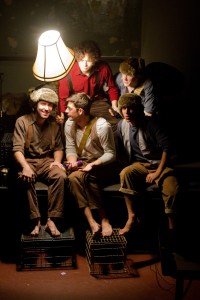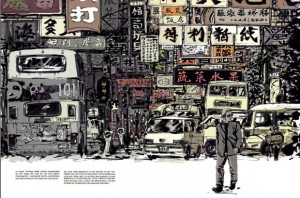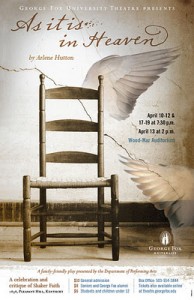I have been trying to figure out why I am so drawn to the idea of prison theatre. This is one of those instances where my heart and body know something before my mind does. I have a physical reaction when I think about the importance of doing theatre in prisons. While doing some research, I came across the Poetic Justice Project, which works with previously incarcerated people to help them find their voices and creativity, and to combat California’s extremely high recidivism rate. This first poem (which I found on their website) helped me to understand why I am so excited by prison theatre.
Prison Poetry Reading
Dave Ochs
I was asked to read poetry
At a prison
Which I've done
Several times before
Oddly or maybe
Not so oddly enough
A prison poetry reading
Is usually much better
Than the average
Cafe poetry reading
Not only are the inmates
Superior poets
They're a responsive audience
In that they listen more intently
Resulting in charged atmosphere
Where weight is given
To every word
As opposed to the
Polite lip service
At the coffee klatch gatherings
Maybe you have to feel
A sense of desperation
For poetry to mean more
Than mere world play
But a vehicle
To carry you
To a better place
Originally from Brooklyn, Dave Ochs has spent the majority of his adult life in Santa Maria. He's published more than 100 poems since 1996 and is a frequent reader on California's Central Coast. He has taught poetry in prison and has worked with Poetic Justice Project, teaching workshops for incarcerated and formerly incarcerated people.
Prison is a place where art is needed. Truly, directly, desperately needed. It’s a place where art can liberate, metaphorically and literally, which becomes vital when one is imprisoned metaphorically and literally. I believe that art is needed in the world in general, but in such a small, at risk community as a prison, I believe that art has the power to create deep, lasting, life-changing inspiration. It can be a lifeline. An awakening. For the prisoners and the outside world. This feels exciting and important to me, and like I could learn and give a hell of a lot by participating in it. I was astounded by the poems that I came across on the Poetic Justice Website. They are beautiful and heartbreaking and joyous and just plain moving, good poetry. There are more poems on the website besides what I have posted below, I strongly encourage you to go read them!!
I strongly believe that it is important to empower the voices that are not empowered by society. I was deeply inspired by a quote that I came across while researching Luis Alfaro, author of Oedipus El Rey (an adaptation of Sophocles’ Oedipus set in an L.A. prison and Chicano Barrio). The play addresses the problem of recidivism as does the Poetic Justice Project. Alfaro spent time working with young prisoners. Describing this experience, he says:
“People who have made really big mistakes in their lives are very complicated people. They represent the complexity we are looking for in our work. Incarcerated children are missing elements that many of us take for granted—a notion of family, security, love, or even intelligence about the world. The first gig I had in a youth prison was a poetry workshop with teen felons, 12-17 years old. Five minutes into it I realized that none of them could read and few could write—which didn’t seem to matter because I couldn’t use pencils or pens anyway. No one told me this beforehand. Out of sheer terror and desperation, we stood in a circle, created a rhythm with our hands and bodies, and each student had to tell their life story through rap. I set some parameters about language and violence, and they were able to adapt. I could not ask them to write down their lives and crimes, but there was no law saying that they could not say out loud their histories. And they did, and the stories were extraordinary and sad and full of regret and fear and lack of hope. And that is when I realized that everyone is a playwright. Some of us just have training.”
-From an interview with Alfaro by John M. Baker, Production Dramaturg and Literary Manager of Wooly Mammoth Theatre.
Below are the poems from the Poetic Justice Website.
Ricky Lee
Darren Glenn Attebery
Out doing the same old thing,
My childhood friend Ricky Lee Eusted.
Playing the clown late at night,
Being 43 does not mean much to Ricky.
It seems as if all the beauty has left his heart.
I remember when he and I were 18
Not caring about anything.
Twenty four years behind
What is left of my smile
Cured me of that.
But my old friend Ricky Lee
Still is lost.
The Tehama County jail
Holds him again.
And I found it sad
To read his name in the paper.
The drugs do not cure
The hidden rage inside.
They only increase the
Flame.
Until the night watchman
Of your mind tears
The soul blind.
And that is why
Ricky Lee
Is not Free.
Dumb Love
Has anyone touched when the crescent moon bloomed?
Faded between life and passionate tragedy
Wilted before a doorway open to only you
Rode the crest of colors when the sun goes down
Stood before a reality you could not resist
Has love ever struck you dumb?
The Shade of the Sun
does not belong
where the nights miss love
Robbing hearts
spilling invisible tears
all over the sheets in the dark
And the days
only grow stark weeds
that breed such bitterness
It's where time bends men over
with only a taste
of life's dust in their veins
The granite hearts
shatter with ease
upon this feather filled anvil
As shackled faces
continue to swim
in an empty well
I was born Darren Glenn Attebery in 1964 and raised in the San Fernando Valley. My father died when I was six. His death left me without a guide in life and I was locked up at 12. Except for a few trial periods outside I was incarcerated until I was 18. At 18, I had changed from a timid fearful boy into a man who thrived on anger and a sense of injustice in his heart. I committed violence like I was justified, committing armed robbery and assaults. I ate up my 20s, 30s like they were nothing, with 19 years in state prison. My anger consumed me until on my last term, two of my father's sisters found me in New Folsom. They began to visit and send me books. My idea of being a completely worthless person began to change. I began to learn about myself and my father's family. While in prison, I had a son from a family visit. It seemed like God or a divine intervention and the mellowing of my angry spirit all came together as one. The books my aunt sent exploded upon my soul. My son gave me a dream. And two strikes taught me that freedom was no longer a game. Poetry has invaded my heart and mind. And not the weak idea of modern poetry. But like the Skalds and Bards of old, I burn with passion and desire. This world, this life is beautiful. It should be shouted from the hills and streets. --Darren Deichen
Beauty
I hold on to the playground laughter
and try to believe these tiny seeds
won't be choked by briars and thorns before
they have a chance to blossom. A rain-marred
sunny day muddies the path where
thunder sounds like an SKS. A wake quiets
the rising tide until the procession passes by.
Homies dressed in their best, creased khakis
and button-down Pendletons, stand by somberly
as a mother buries her eldest while crying
over the loss of her other two: 16-year-old
twins facing life for the payback. My trigger finger
itches as I hug her, too ashamed for once
to look in her eyes. She was like a mother
to me too; her welfare home welcoming me
whenever I had to flee the heavy hand
of momma's new boyfriend of the week. By fifteen,
I was banged out and pistol happy,
and hands not noticably lighter in the Wilson house.
Now I'm 25, fresh out after walking nine,
and trying to acclimate myself to a society
that never wanted me. Does Barack have an answer for this?
My church-going momma who married a
God-fearing man six years ago, seems to think
so. I see hope in her beautific eyes
as preaches the Word to me through sublime actions,
without having to utter a sound. And somewhow,
I feel a slight stirring in me, too, as I
hold on to the playground laughter and try to believe
these tiny seeds won't be choked by briars and thornsJon-and-Willie-as-Lucky-and-joker-72.jpghands_in_chains.jpg
before they have a chance to blossom.
Shaka Washington III received an Honorable Mention in the 2009 PEN American Poetry Writing Contest for "Pieces of a Dream." He also won Honorable Mention in PEN's 2007 contest. His work has appeared in DanaLiterary.org, Timbooktu.com, Struggle and PoeticsNoire.
 This was my first post, but I just realized that I messed up the blogs earlier and it didn't post on the group one, but my individual one? I don't know but here it is!!
This was my first post, but I just realized that I messed up the blogs earlier and it didn't post on the group one, but my individual one? I don't know but here it is!! Rummaging through the Guardian, I stumbled across an article about
Rummaging through the Guardian, I stumbled across an article about 

